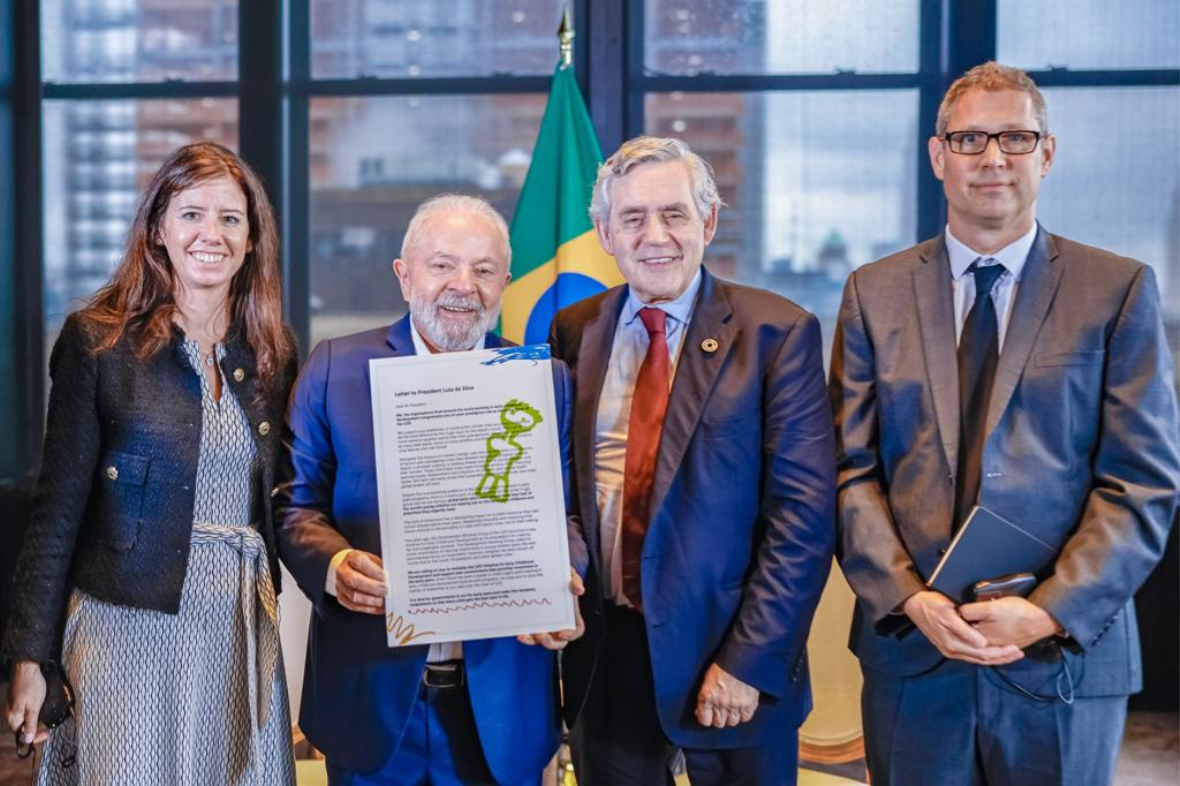150+ early childhood organisations urge G20 to address early years crisis

Global charities like Lego Foundation, UNESCO and UNICEF are calling on the G20, led by Brazil's President Lula da Silva, to address the lack of funding for early childhood care and education.
- Signatories including Lego Foundation, UNESCO, UNICEF and the International Rescue Committee urge G20 to boost investment in the under-fives
- Currently, half of pre-primary children globally are not enrolled in any form of early education
- Experts say investing in the early years is both “a moral must and a strategic win for the G20”
Leading global charities have called on the G20 to take urgent action to address the severe lack of funding in early childhood care and education.
Their appeal addresses the dire need of hundreds of millions of children who are missing out on childcare or pre-primary education.
In an open letter to Brazil’s President Lula da Silva – who takes over the presidency of the G20 on December 1 – the organisations say that world leaders are ignoring the overwhelming evidence of the benefits of investing in the early years, putting children’s futures unnecessarily at risk.
It was signed by more than 150 prominent early childhood organisations from around the world, including UNICEF, UNESCO, the Lego Foundation, the Roger Federer Foundation, Sesame Workshop and the International Rescue Committee, as well as many organisations in Brazil including Fundação Maria Cecilia Souto Vidigal.
More than half of the world’s children – 350 million – do not have access to the childcare they need and about half of pre-primary aged children are not enrolled in any form of early education.
“Despite the overwhelming evidence of the high returns of investing in early years programs, there is a woeful lack of public funding for the under-five age group and we are facing a global early years crisis where more than half of the world’s young children are missing out on the early years childcare and preschool they urgently need,” says the letter, which has been coordinated by the Early Childhood Development Action Network (ECDAN) and Theirworld,
“This lack of investment has a devastating impact on a child’s future as they start school already behind their peers, deepening inequality and impacting their future chances in life and ability to cope with future crises, not of their making.
“Existing gender norms also mean the brunt of the global childcare crisis falls on women, with high childcare costs or lack of availability the main reason why women cannot enter or must leave the workforce.”
The signatories are calling on the G20 to revive a pledge they made in 2018 to invest in the early years, which has been blown off course by the Covid-19 pandemic and global economic downturn.
President Lula da Silva has announced the G20’s theme will be a “building a fair world and a sustainable planet”.
But experts argue that ambition can only be met by increasing investment in the early years.
Investing in the early years is both a moral must and a strategic win for the G20.
Justin van Fleet, President of Theirworld.
He continued: “Brazil has set a vision of building ‘a fair world and a sustainable planet’. Early years care is vital in that mission – it’s when the building blocks for a prosperous and equitable future for everyone are laid. The undeniable reality is that without early years support children are at risk of going through life with poorer physical and mental health. They face a struggle to learn and, later, to earn a living.”
Sarah Brown, Chair of Theirworld, said: “The first five years of a child’s life are a once-in-a-lifetime opportunity for children to flourish, but children in rich and poor countries alike are being let down on a global scale. This has huge ramifications for everyone, not least women who disproportionately bear the brunt of the childcare crisis, forcing them to leave the workforce because of unaffordable nursery fees.
“The G20 poses a fantastic opportunity to change this, giving leading nations the chance to pledge to end the global early years crisis. It’s time governments step up and provide young children the best opportunity to build a better and brighter future.”
The letter is part of the growing global Act For Early Years campaign, which is supported by hundreds of children’s organisations, businesses, celebrities and youth activists.
The campaign is calling for a transformation in the provision of early years care and support. It is backed by an extensive and hard-hitting report, which lays bare the scale of the early years crisis.
Elizabeth Lule, Executive Director of ECDAN, said: “The benefits of high-quality childcare are well documented – and they cascade across society.
“Children benefit by being exposed to stimulating environments at a critical time in their development. Women benefit from having the opportunity to remain in or enter the workforce and build financial independence. And local and national economies benefit as new jobs are created, family incomes grow, and tax revenue expands.”
The letter asks President Lula da Silva, whose country has been a leader in child rights and investing in early childhood development, “to carry this mantle of leadership as you take over the chair of G20”.